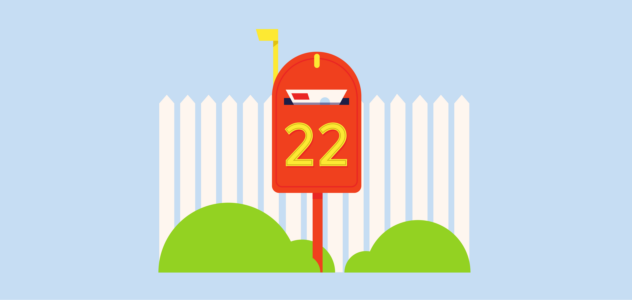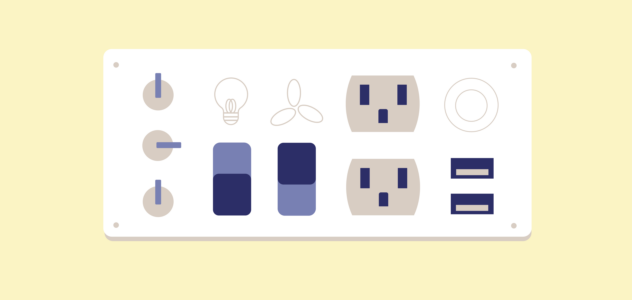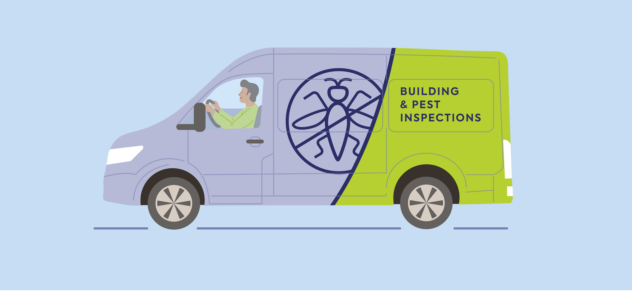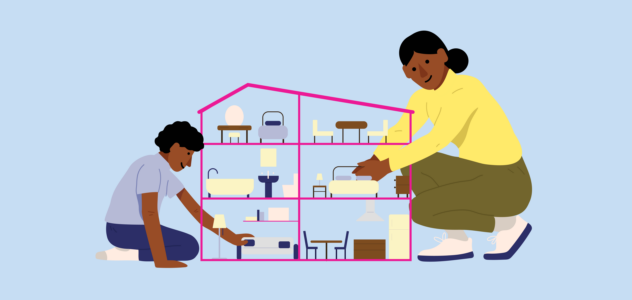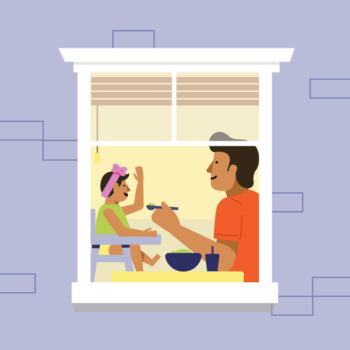Your no-fluff guide to guarantor loan requirements in Australia
So you’re bending over backwards to save up for a house deposit, and that 20% deposit seems like a constantly moving goal post.
You’re almost there and then BAM. House prices jump up again. And again. And again.
The good news? You don’t necessarily have to win the lottery to land yourself in the property market thanks to a beautiful thing called a guarantor home loan.
A guarantor is someone (usually a family member) who helps to secure your home loan and potentially increase your borrowing power.
So if you’re asking yourself who can be my guarantor? What are the requirements for a guarantor? And what’s the difference between a security and servicing guarantor? Then you’re in the right place.
But first, what is a guarantor?
A guarantor is someone who adds an extra layer of security to your home loan. This is often done through the equity of a property they own (security guarantor) or less commonly through income assistance (servicing guarantor). When someone becomes your guarantor, they agree to take on some of the risk if your loan repayments can’t be made (for whatever reason).
So in other words, they’re doing you a solid favour and giving you a big leg up onto the property ladder. We’re talking more borrowing power, potential savings on Lenders Mortgage Insurance (LMI) and perhaps throwing that housewarming party in your new home, sooner.
But full transparency: deciding whether to go with a guarantor (and who that guarantor will be) is a big decision. After all, they’re carrying some of your home loan risk for you, so each party needs to be crystal clear on what’s involved (more on that in a minute).
What are the different types of guarantees?
There are two main ways a guarantor can provide support: a family security guarantee or a servicing guarantee. In most cases, we’re talking about a family security guarantee.
What is a family security guarantee?
As the name suggests, a family security guarantee is when a family member guarantees your loan using the equity in their property (or sometimes, cash). This is a limited guarantee, meaning the guarantor has the final say over the amount they want to commit.
So, no money changes hands between the guarantor and the lender, but when they sign on the dotted line they’re committing to being responsible for the limited guarantee amount.
Having a family security guarantee can be great because…
- You can maximise the amount you want to borrow, giving you more property options to choose from. Who doesn’t love options?
- If you use a guarantor to reduce your Loan to Value Ratio (LVR) to less than 80%, you may not have to pay LMI (the insurance a lender takes out in higher risk situations).
Let’s break it down with an example
Say you’re looking to buy a property worth $600,000. Go you.
You’ve currently saved a $60,000 deposit, which equates to 10% of the house price. This isn’t quite enough to comfortably secure the loan and dodge LMI.
In order to secure the home loan for this property, your parents go guarantor.
They choose a limited security guarantee of $60,000 using the equity in their house. When combined with your savings, this equates to $120,000 which is 20% of the house price (take note, we’ve excluded stamp duty for the sake of this example).
This means you can borrow the money you need, land your first home and avoid LMI. Booyah.
Then, if the value of your property has gone up or you’ve paid back some of the outstanding balance, you may be in a position to release them from being your guarantor. Happy days.
Ok, then what is a servicing guarantee?
We’re not going to dive too deep into a servicing guarantee, because the truth is, it’s rarely used these days.
A servicing guarantee is when a guarantor uses their income capacity to help guarantee that loan repayments will be made. They may also be held responsible for paying back your entire home loan in a situation where you can’t. It’s a big commitment.
In rare cases, you can also have a security and servicing guarantor, where they use a combination of their home equity and income to assist you.
Who can be a guarantor?
Ah, the burning question for many first home buyers… Who can be my guarantor, anyway? (AKA home loan hero).
The answer can vary between lenders, but in most cases, close family members are accepted (provided they also meet the guarantor requirements). Family members include…
- Parents
This one’s the most common. Thanks, folks!
- Spouse or de facto
There are often rules surrounding this one, like having separate home loans and finances. For obvious reasons.
- Family
In some cases, siblings, adult children, grandparents, aunts and uncles may be your guarantor. But remember, each lender is different and they’ll most likely take into account your specific circumstances.
Who can’t be a guarantor?
Unfortunately, you can’t just pick your long distance cousin from Germany and send them a thank you postcard at Christmas. There are rules, and rightly so.
Many lenders won’t allow friends, distant relatives, colleagues, ex partners, minors, people with a bad credit history or elderly relatives.
What are the guarantor home loan requirements?
Okay, so you’ve got a close family member who is willing to be your guarantor. Yahoo!
But they’ve still got to tick a few more boxes (on top of being related to you). Things like…
- Equity in their home
In most cases, your guarantor will use their own property to help secure your loan (they can use the difference between the current value of their property and the amount they still owe on their home loan, if any). So, your guarantor doesn’t necessarily need to own their home outright and be mortgage free, they just need to have enough equity built up to take on some of your mortgage. This is where seeking advice from an independent legal and financial professional comes in handy.
- Stable income
A lender may weigh up their income (on top of their home equity) before making a decision.
- Close relationship
Most lenders will want to know you have a close relationship with this family member to avoid any sticky situations.
- Australian citizen or permanent resident
Yep, unfortunately you can’t choose a guarantor from outside of Australia.
- Older than 18
Need we say more?
What are the risks for guarantors?
Let’s talk about the elephant in the room, the risk for guarantors.
First of all, your guarantor will be liable for the amount they guarantee.
So (extreme) worst case scenario: In a situation where a borrower can’t repay their loan (and their house hasn’t built up enough equity) the guarantor may have to pay the lender up to the amount they guaranteed. And if they don’t have the cash lying around? Their property may be sold to cover it. Ouch.
Your guarantor may also have trouble getting a new loan if they choose to move home, so make sure you sit down and have a chat about their future plans.
But it’s not all doom and gloom. You can greatly reduce the risk for your guarantor by seeking independent legal and financial advice to weigh up the ins-and-outs of your situation. Your guarantor will almost always be required by the lender to get independent legal advice too, which we think is essential.
How much of a deposit do you need with a guarantor?
Well, how long is a piece of string?
Ok, ok, we know you wanted a straight answer. But the truth is, it depends on your situation and the lender you go with. In some cases, you could save up as little as 10% of the purchase price. Sometimes 5%. Sometimes even less. The best way to get a clear answer is to speak with a broker (that’s what we’re here for).
Can you remove the guarantee?
Yes. Having a guarantor (or being a guarantor) isn’t something you generally want hanging over your head for the life of your loan. There are a few ways you can remove the guarantee…
- When the Loan to Value Ratio (LVR) is less than 80%
The LVR is calculated by dividing the loan amount by the property value. Anything above 80% is considered more risky by most lenders. The good news? If your LVR decreases to less than 80% (due to paying down your loan, increasing property value or a combination of both) you may be able to remove your guarantor.
- Refinancing
When you refinance you’re essentially replacing your mortgage with a new one. It’s like a refresh, which can ultimately affect your home loan balance and repayments. If your home value has gone up, this may put you in a position to remove your guarantor.
- You haven’t missed any payments for 6 months
A lot of lenders will look at your repayment history before removing a guarantor. If it’s squeaky clean (and you’ve also met some of the other criteria above) you may be able to remove your guarantor.
So is it worth getting a guarantor?
For a lot of first home buyers, a guarantor is the leg up they need to land themselves in the property market. It’s an option to increase your borrowing power and avoid Lenders Mortgage Insurance.
It can be worth the effort if you have a close family member who’s eligible and willing to do you a solid favour, and you’re both in a steady and confident financial position.
If you’re looking into having a family member as your guarantor, weighing up your options or just starting your research, we’d love to help – no obligations.
Get started by speaking to a Finspo home loan expert today.











